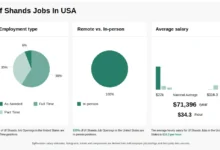ZS Careers

The field of zs careers, also known as zero-shot careers, has been gaining significant attention in recent years due to its potential to revolutionize the way we approach career development and job training. At its core, the concept of zs careers revolves around the idea of individuals being able to transition into new careers or roles without requiring extensive prior experience or traditional qualifications. This paradigm shift is made possible by advancements in technology, particularly in the fields of artificial intelligence, machine learning, and data analytics, which enable personalized learning pathways and skills assessments.
One of the primary drivers behind the growth of zs careers is the increasing demand for skilled workers in emerging industries such as renewable energy, cybersecurity, and healthcare technology. As these sectors continue to expand, the need for professionals with specialized skills and knowledge has become more pressing. However, traditional education and training systems often struggle to keep pace with the rapid evolution of these fields, leading to a mismatch between the skills workers possess and the skills employers require. Zs careers aim to bridge this gap by providing individuals with the opportunity to acquire the necessary skills and competencies through non-traditional, often online-based, learning platforms and experiential training programs.
Key Points
- Zs careers focus on transitioning individuals into new roles without requiring traditional qualifications or extensive prior experience.
- Advancements in AI, machine learning, and data analytics enable personalized learning pathways and skills assessments.
- The growth of emerging industries such as renewable energy, cybersecurity, and healthcare technology drives the demand for skilled workers.
- Zs careers aim to address the skills mismatch by providing non-traditional learning and training opportunities.
- Personalized learning pathways and experiential training programs are key components of zs careers.
Understanding the Concept of Zs Careers

The concept of zs careers is deeply rooted in the understanding that traditional career development pathways may no longer be effective in today’s fast-paced, technology-driven job market. With the rise of the gig economy and the increasing prevalence of remote work, individuals are seeking more flexible and adaptable career options. Zs careers cater to this demand by offering a more fluid and dynamic approach to career progression, where individuals can continuously update their skills and transition into new roles as the job market evolves.
A critical aspect of zs careers is the role of technology in facilitating this new approach to career development. Platforms utilizing AI and machine learning algorithms can analyze individual skills, interests, and career goals to provide personalized recommendations for learning pathways and job opportunities. This not only streamlines the process of career transition but also ensures that individuals are well-matched with roles that align with their strengths and aspirations.
The Role of AI in Zs Careers
Artificial intelligence plays a pivotal role in the implementation and success of zs careers. AI-powered systems can process vast amounts of data related to job market trends, skill requirements, and individual career trajectories, providing insights that would be impossible for human analysts to match in terms of scale and speed. Furthermore, AI-driven platforms can offer real-time feedback and adaptive learning pathways, ensuring that individuals are always working towards acquiring the most relevant and in-demand skills.
| Technology | Application in Zs Careers |
|---|---|
| Artificial Intelligence (AI) | Personalized learning pathways, skills assessments, and job matching |
| Machine Learning (ML) | Predictive analytics for job market trends and skill demand forecasting |
| Data Analytics | Insights into individual career progression and skills gap analysis |
Implementing Zs Careers in Practice
The practical implementation of zs careers involves a multifaceted approach that includes the development of AI-powered learning platforms, the creation of experiential training programs, and the establishment of partnerships between educational institutions, employers, and technology providers. A key challenge in this implementation is ensuring that the skills and competencies acquired through zs careers pathways are recognized and valued by employers, which requires a shift in how we perceive and validate skills and qualifications.
Moreover, the success of zs careers depends on the ability to address potential biases in AI algorithms and ensure that the opportunities provided are inclusive and accessible to a diverse range of individuals. This includes considerations for those with disabilities, from underrepresented communities, or with non-traditional educational backgrounds. By prioritizing inclusivity and equity, zs careers can truly democratize access to career advancement and contribute to a more vibrant and diverse job market.
Addressing Challenges and Limitations
Despite the potential of zs careers to revolutionize the job market, several challenges and limitations need to be addressed. These include the need for standardized frameworks for recognizing and validating skills acquired through non-traditional pathways, the potential for job displacement due to automation, and the ethical considerations surrounding the use of AI in career development and job matching. By engaging in ongoing research, dialogue, and policy development, it is possible to mitigate these challenges and ensure that zs careers contribute positively to the future of work.
What are the primary benefits of zs careers for individuals?
+
The primary benefits include the ability to transition into new careers without traditional qualifications, personalized learning pathways, and the opportunity to continuously update skills to remain relevant in the job market.
How do AI and ML contribute to the effectiveness of zs careers?
+
AI and ML enable personalized learning, predictive analytics for job market trends, and efficient job matching, making the career development process more targeted and effective.
What are the key challenges in implementing zs careers?
+
Key challenges include ensuring the recognition and validation of non-traditionally acquired skills, addressing potential biases in AI algorithms, and mitigating the risks of job displacement due to automation.
In conclusion, the concept of zs careers represents a significant shift in how we approach career development and job training, offering a more flexible, adaptable, and inclusive pathway to career advancement. By leveraging technology, particularly AI and ML, and addressing the challenges and limitations associated with this new paradigm, we can unlock new opportunities for individuals and contribute to a more dynamic and responsive job market. As we move forward, it will be essential to prioritize ongoing research, dialogue, and innovation to ensure that zs careers realize their full potential in enhancing the future of work.








